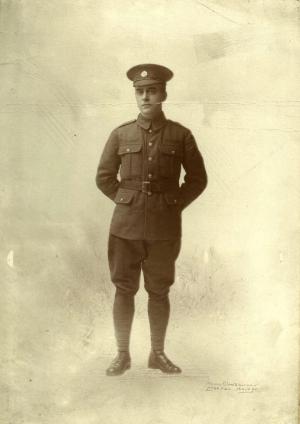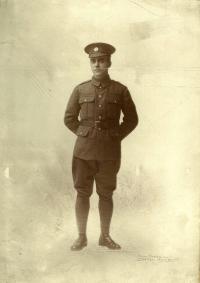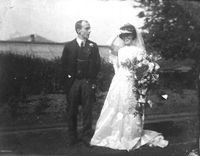
Brothers at War: Fred Harper Brown
Fred was the son of Richard Harper Brown and Annie Brown (née Crossley), born in Hebden Bridge on 30th April 1883. He was the second eldest of seven siblings and was one of four brothers who fought in the First World War. On 22nd June 1910, he married Martha Adelaide Brown (née Grundy) and went on to have two daughters, Margot and Pauline. Prior to being conscripted, Fred worked as a manager at the family company R. B. Brown & Sons Ltd. Given the different locations of mills in the business, he lived in many different areas including Hebden Bridge, Headingley, and Woodlesford before settling back in Hebden Bridge. Fred went on to participate in the First World War from late 1916 until its conclusion in 1918 in both the Infantry and the Labour Corps. He wrote many letters to his elder brother, Robert Broughton Brown, detailing his experiences throughout.

South Pennine Archives, LHC BRO 35 S
In June 1916, Fred’s elder brother, Robert, addressed a military tribunal regarding the conscription of Fred. A newspaper article published in the Todmorden Advertiser and Hebden Bridge Newsletter entitled 'Departmental Managers Let Off' outlined Robert’s plight, stating the need for Fred to remain as manager of the family business. The Military Service Act passed in January 1916, though, required the conscription of single men between the ages of 18 and 41. Throughout the war, families were desperate to find ways for their loved ones to become exempt, resulting in military tribunals to decide whether someone went to war or not. The criteria to become exempt as a man included being medically unfit, being a clergyman or teacher, or being deemed to be an essential industrial worker. Alongside these exceptions were conscientious objectors who refused to fight based on moral grounds. They were primarily given civilian jobs or non-combatant job roles on the front line. Due to a contract with the British Government to supply clothing to the military, the tribunal decided that Fred should be placed in the reserves as a compromise. Newspaper articles also show that other business owners in the local area had the same problem. One such article was titled 'Ironmonger's Son Exempted' demonstrating that there were others who were similarly petitioning for their family members to remain at home as an industrial necessity.
Based on the newspaper findings and the date of Fred’s letters to his brother Robert, Fred was deployed in late 1916; being assigned to the Labour Corps in December 1917 after completing training around July 1917. He then joined the Northamptonshire Regiment (referred to as 1st Northants Regt in the letters), an Infantry regiment. Fred was reassigned to the Labour Corps due to an injury after spending a substantial amount of time in hospital, which we learn from his younger brother Frank’s letters to Robert. At some point before December 1917, Fred had
got 6 mos P.B. poor devil
meaning that he was placed on a permanent medical base for 6 months.
The Labour Corps is not a well-known section of the army during the First World War. It was formed in 1917 of men who were not well enough to fight on the front lines as a way to make the army more efficient. This is something Fred commented on candidly in his letters:
I have been transferred to a labour company, seeing I am no use to the infantry.
The Labour Corps included subdivisions of British, Chinese, African and Middle-Eastern men and was stationed across the front lines. The responsibilities of the Labour Corps included: cooking and cleaning for the men on the front lines, building and repairing roads and railways, felling timber, and recycling useful equipment and items left on the battlefields such as rifles and boots.
Fred provided more details in one of his letters:
With regard to my category being B2, as far as I remember that meant back home ‘fit for labour abroad’, men who knocked up the line mobs, as I was, who can be still of use are marked B2 and put into the Labour Corps, they do all sorts of work, from the docks up to trench digging.
Frank’s letters show that it was hard to communicate with the men in the Labour Corps as they seemed to move around an awful lot, with both brothers not having regular communication with him. Frank mentioned that:
He stands a chance of being moved about considerably and also being on half rations. Also working on such things as roads and not far back. Far from nice. In fact, a rotten life.
Fred longed to return home as his brother Frank had done a few months prior, but did not get discharged until early 1919 – it was only after the war had finished that he was finally reunited with his loved ones. The last letter he wrote to his brother was on 8th January 1919 suggests his unhappiness at his continued service:
You say you want me as much as I want to get back, don’t you believe it my son, for I am distinctly and easily first in the ‘wanting’ stake

South Pennine Archives, LHC BRO 34 M